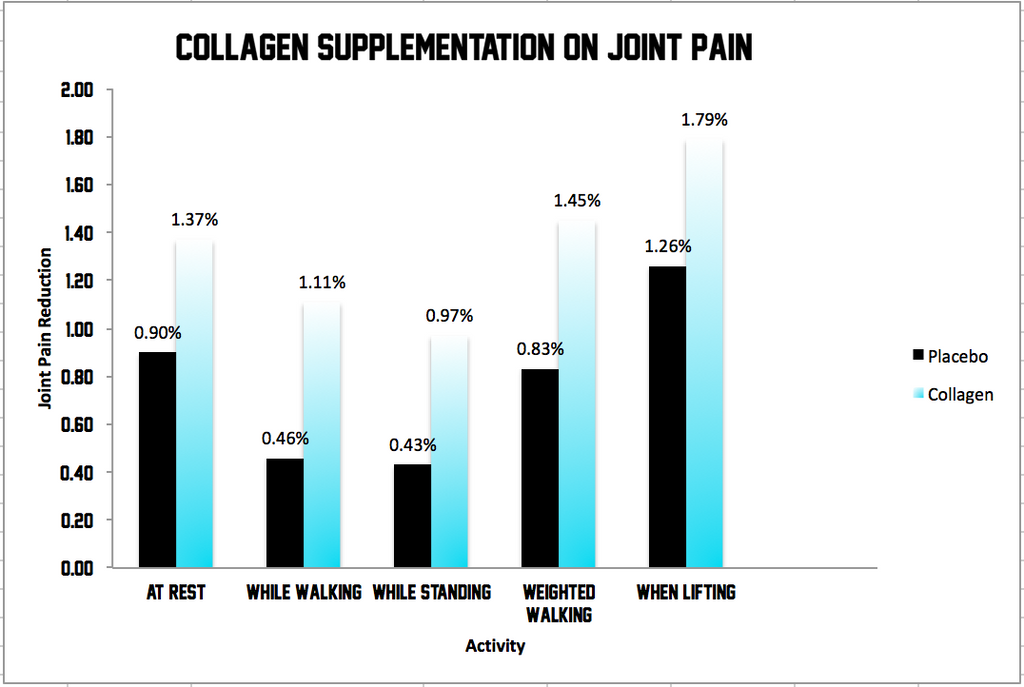Study Design: randomized double-blind controlled trial
Author Information Department of Nutrition and Sports Nutrition for Athletics, Penn State University, University Park, PA 16802, USA
Clark KL1, Sebastianelli W, Flechsenhar KR, Aukermann DF, Meza F, Millard RL, Deitch JR, Sherbondy PS, Albert A.
Background
Collagen hydrolysate is a nutritional supplement that has been shown to exert an anabolic or building effect on cartilage tissue. The objective of this study was to investigate the effect of collagen hydrolysate on activity-related joint pain in athletes who are physically active and have no evidence of joint disease.
Methods
A prospective, randomized, placebo-controlled, double-blind study was conducted at Penn State University in University Park, Pennsylvania. Parameters including joint pain, mobility, and inflammation were evaluated with the use of a visual analogue scale during a 24-week study phase. Between September 2005 and June 2006, 147 subjects who competed on a varsity team or a club sport were recruited. Data from 97 of 147 subjects could be statistically evaluated.
One hundred and forty-seven subjects (72 male, 75 female) were randomly assigned to two groups: a group (n = 73) receiving 25 mL of a liquid formulation that contained 10 g of collagen hydrolysate (CH-Alpha) and a group (n = 74) receiving a placebo, which consisted of 25 mL of liquid that contained xanthan.
Results
When data from all subjects (n = 97) were evaluated, six parameters showed statistically significant changes with the dietary supplement collagen hydrolysate (CH) compared with placebo
Joint Pain At Rest - (CH vs. placebo (-1.37 +/- 1.78 vs. -0.90 +/- 1.74 (p = 0.025))
Joint Pain When Walking - (-1.11 +/- 1.98 vs. -0.46 +/- 1.63, p = 0.007)
Joint Pain When Standing - (-0.97 +/- 1.92 vs. -0.43 +/- 1.74, p = 0.011)
Joint Pain When Carrying Objects - (-1.45 +/- 2.11 vs. -0.83 +/- 1.71, p = 0.014)
Joint Pain When Lifting - (-1.79 +/- 2.11 vs. -1.26 +/- 2.09, p = 0.018)
When a subgroup analysis of subjects with knee arthralgia (n = 63) was performed, the difference between the effect of collagen hydrolysate vs. placebo was more pronounced
Joint Pain At Rest - (p = 0.01 (-1.67 +/- 1.89 vs. -0.86 +/- 1.77))
Joint Pain When Walking - (p = 0.003 (-1.38 +/- 2.12 vs. -0.54 +/- 1.65))
Joint Pain When Standing - (p = 0.015 (-1.17 +/- 2.06 vs. -0.50 +/- 1.68))
Joint Pain When Running - (p = 0.027 (-1.50 +/- 1.97 vs. -0.80 +/- 1.66))
Joint Pain When Changing Running Direction- (p = 0.026 (-1.87 +/- 2.18 vs. -1.20 +/- 2.10))
Conclusions
This was the first clinical trial of 24-weeks duration to show improvement of joint pain in athletes who were treated with the dietary supplement collagen hydrolysate. The results of this study have implications for the use of collagen hydrolysate to support joint health and possibly reduce the risk of joint deterioration in a high-risk group. Despite the study's size and limitations, the results suggest that athletes consuming collagen hydrolysate can reduce parameters (such as pain) that have a negative impact on athletic performance















